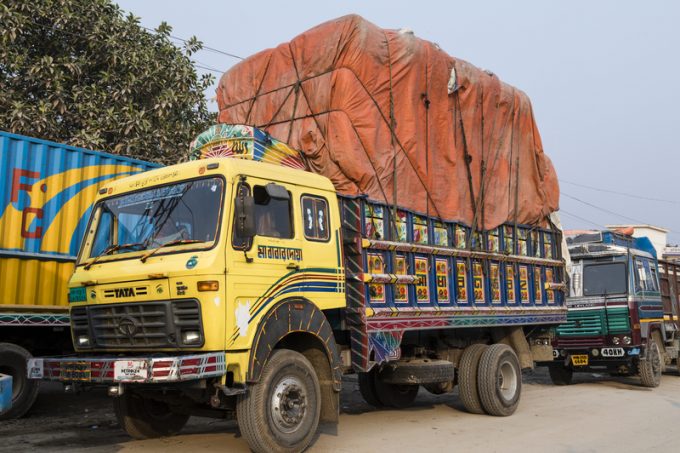Overtime ban at port of Montreal goes on as 'special mediator' is rejected
Canadian shipping stakeholder hopes of a prompt resolution of the dispute at the port of ...
GM: RAISING THE ROOF GGM: IN FULL THROTTLE GZIM: MAERSK BOOST KNIN: READ-ACROSSMAERSK: NOT ENOUGHMAERSK: GUIDANCE UPGRADEZIM: ROLLERCOASTERCAT: HEAVY DUTYMAERSK: CATCHING UP PG: DESTOCKING PATTERNSPG: HEALTH CHECKWTC: THE FALLGXO: DEFENSIVE FWRD: RALLYING ON TAKEOVER TALKODFL: STEADY YIELDVW: NEW MODEL NEEDEDWTC: TAKING PROFIT
GM: RAISING THE ROOF GGM: IN FULL THROTTLE GZIM: MAERSK BOOST KNIN: READ-ACROSSMAERSK: NOT ENOUGHMAERSK: GUIDANCE UPGRADEZIM: ROLLERCOASTERCAT: HEAVY DUTYMAERSK: CATCHING UP PG: DESTOCKING PATTERNSPG: HEALTH CHECKWTC: THE FALLGXO: DEFENSIVE FWRD: RALLYING ON TAKEOVER TALKODFL: STEADY YIELDVW: NEW MODEL NEEDEDWTC: TAKING PROFIT

A countrywide three-and-a-half day strike by Bangladeshi truckers ended last night following discussions with the country’s home minister.
The truckers began the action on Friday after the government raised diesel prices by more than 21%, and while the government said it would not cut the price of fuel, it offered to help truckers raise their rates.
It also decided to suspend a decision to raise tolls on two river bridges.
“The government has agreed to meet our demands, so we are going back to work,” said Tajul Islam, secretary general of the Bangladesh Truck Covered Van Goods Transportation Owners’ Worker Coordination Council.
Two new cargo villages
Growing cargo demand has driven Bangladesh to develop two cargo villages at the airports in Chittagong and Sylhet.
Dhaka Airport has faced severe congestion in the past few months following the malfunction of two explosive detection scanners (EDSs). The ongoing expansion of its cargo village and construction of a new terminal also deepened the crisis.
As a result, the government formed a committee, which recommended building cargo villages in Chittagong and Sylhet airports so goods can also be air-shipped from there. The ministry of civil aviation and tourism has already asked the civil aviation authority to buy four EDS machines immediately to scan cargo there.
Exporters say demand for both apparel and perishables is growing significantly and delays in sea freight mean apparel exporters must ship by air. Western buyers impose price cuts on exporters or refuse to accept the goods if they are delayed.
Exports on the up
Bangladesh’s export earnings increased by 60.37% year-on-year last month, as demand shot up after stores reopened worldwide. Goods worth $4.73bn, up from $2.94bn a year earlier, were exported during the month, the highest October sales in the country’s history.
Earnings were 13.7% higher than in September, with apparel alone – Bangladesh’s main export – bringing in $3.56bn.
Chittagong Port also saw a significant rise in container handling last month. Data shows that the prime gateway handled 70,270 teu laden and 60,104 empty outbound containers, and 124,659 teu laden and 1,142 teu empty inbound boxes. On the other hand, in September, the port handled 68,891 teu laden and 56,889 teu empty export containers and 120,470 teu laden and 467 teu empty import containers.
Port efficiency improves
During the past three months, almost no incoming vessels to Chittagong Port faced congestion. Of the 446 vessels that arrived, most were berthed with no delays or waiting at the outer anchorage. According to a survey: in August, some 65 vessels; in September, 58; and in October 52 vessels berthed at Chittagong on the same day they arrived.
However, in August, 146 vessels waited one day, 75 waited two days, 28 waited three days and four vessels waited four days to get berthing. This compares with around seven days waiting in May-July.
Chittagong Port Authority chairman Rear Admiral M Shahjahan said he had to take some strategic measures and coordinated efforts to reduce congestion. “Increasing container deliveries to off-docks, fast release of cargo from the port and enhancing quotas for container vessels based on demand have helped,” he said.
Carrier dismay as cost of business rises
Meanwhile, shipping agents in Bangladesh are protesting over a recent government decision to realise agency commission on gross, instead of net, freight rates.
As a result, shipping agents claimed their principals were finding the cost of doing business in Bangladesh higher than in similar locations, like Vietnam, Myanmar, Sri Lanka, India, Malaysia and Cambodia.
Therefore, these principals have reduced their volume to and from Bangladesh, they said.
The shipping agents say the gross freight rates quoted by carriers include terminal handling charges, bunker adjustment and currency adjustment factors, along with canal surcharges. As these relate to carrier costs, they can’t be subject to commission.
“The loss of interest by shipping lines in maintaining volumes to and from Bangladesh due to soaring costs and lack of recovery is detrimental to our export trade,” noted Syed Mohammad Arif, chairman of the Bangladesh Shipping Agents Association, in a recent letter to the central bank.
“Such actions from principals will certainly create pressure on an export-oriented industry, which is already suffering from a space crunch in sea-freight,” he added.
Comment on this article